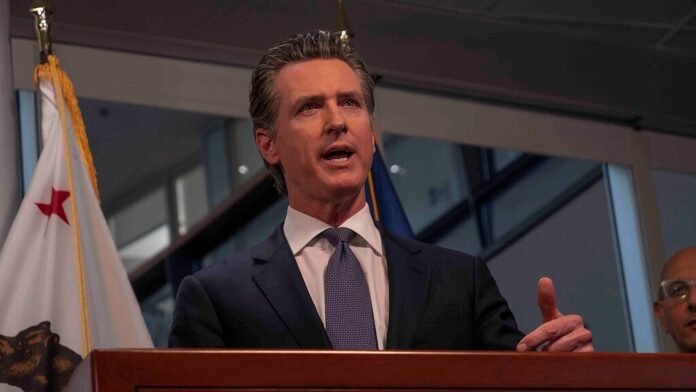California lawsuit takes on Trump’s controversial tariffs in historic legal battle
California has made history by becoming the first state to sue the Trump administration over its controversial tariffs. Governor Gavin Newsom filed the lawsuit, which challenges the emergency powers invoked by President Donald Trump to impose the tariffs. These levies, which have drastically impacted global trade, are a central part of Trump’s strategy to tackle what he sees as imbalances in international trade.
The state of California, home to the fifth-largest economy in the world, is particularly vulnerable to the tariffs, which have disrupted its thriving manufacturing and agricultural sectors. With products like almonds, artichokes, and raisins at stake, Newsom argues that the state has been disproportionately affected by the trade war.
Newsom and Attorney General Rob Bonta announced the lawsuit at a press conference held at an almond farm, one of California’s key agricultural assets. The Golden State produces a staggering 82% of the world’s almonds and is the nation’s sole producer of several other crops. Newsom pointed out that California’s economy, while flourishing, is facing significant challenges due to the tariffs, which currently impose a 10% tax on most countries and a staggering 145% tax on Chinese goods.
In his statement, Newsom emphasised that California was stepping forward on behalf of 40 million Americans, as the state leads the charge in the California lawsuit against Trump tariffs, which he believes are harming the state’s economy and undermining global trade. “That’s why we’re asserting ourselves,” Newsom said, underscoring the state’s pivotal role in the national economy.
The lawsuit takes issue with Trump’s use of the International Emergency Economic Powers Act to justify the tariffs, arguing that this law had never been invoked for such measures and that tariff powers should lie with Congress, not the President. Newsom also referenced US Supreme Court rulings against the Biden administration’s student debt forgiveness plan, which involved similar expansions of executive authority. “If the court is consistent,” Newsom added, “this lawsuit is a lock for the state.”
This legal challenge comes as part of a broader wave of opposition to Trump’s tariffs. While California is the first state to file suit, several businesses and a civil rights group have also raised concerns about the legality of Trump’s actions. Critics argue that the tariffs, while intended to boost American manufacturing, will cause long-term harm to the economy, which could struggle for decades as industries adapt to shifting global trade dynamics.
Although Trump initially championed the tariffs as a way to promote domestic production, many of his promises have faced setbacks. Only hours after announcing steep levies on about 60 trading partners, Trump was forced to pause the tariffs for 90 days, with the exception of China, due to growing backlash from both politicians and market players.
As the legal battle unfolds, all eyes are on how the courts will address the use of executive powers in trade policy. The outcome of the California lawsuit over Trump tariffs could set a significant precedent for future challenges to presidential authority in international trade.
